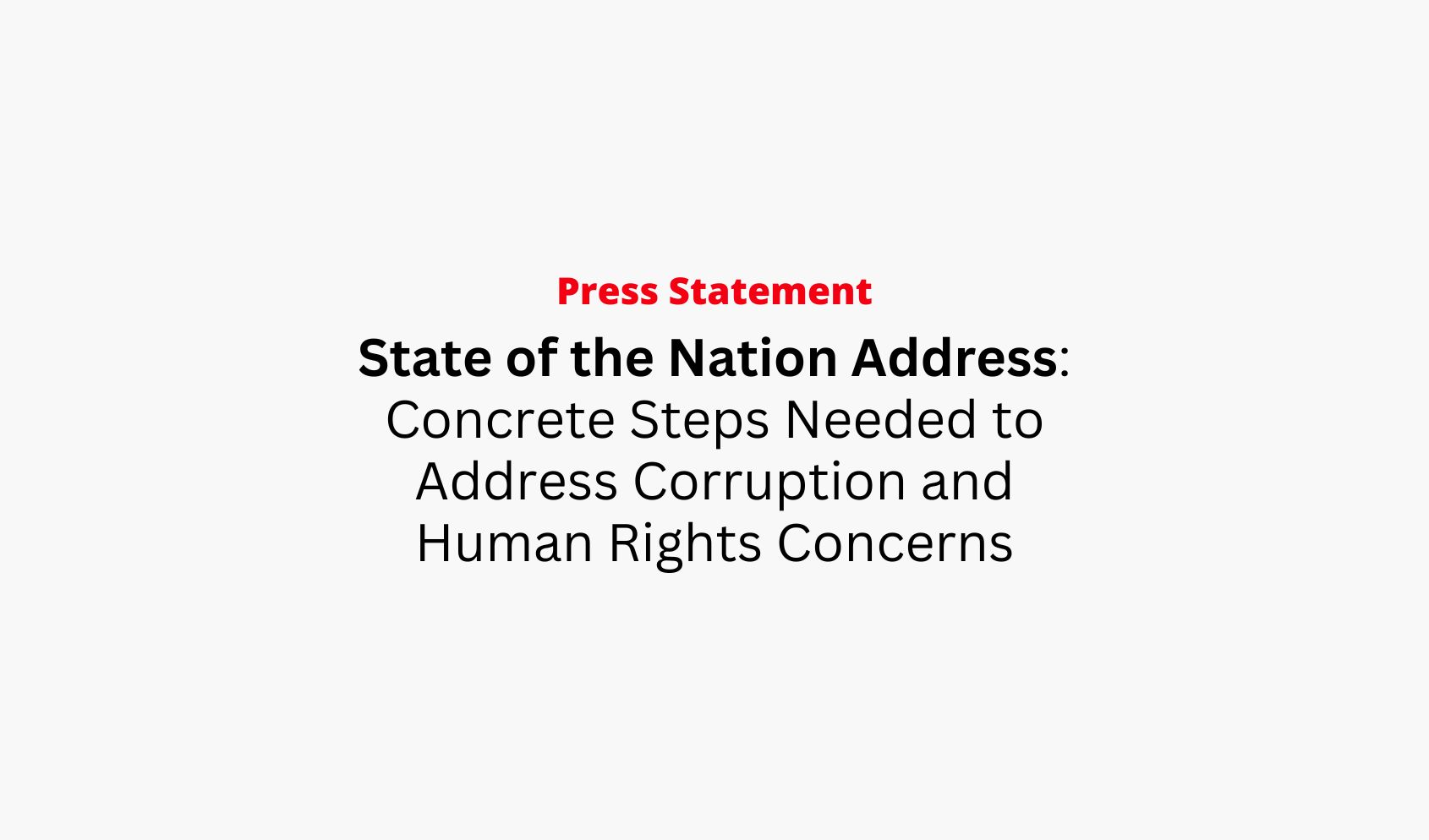THE RED CARD CAMPAIGN
For Immediate Press Release Saturday, 23rd November 2024
Nairobi, Kenya
President William Ruto’s State of the Nation Address delivered on 21st November 2024 painted a picture of hope and progress, in sharp contrast to the reality that millions of Kenyans live in daily. The People’s State of the Nation Report released by Kenyan civil society organisations on Wednesday, 20th November 2024 painted a stark picture of the reality Kenyans face; truth be told, Kenyans are hungry, families are broke and broken, the education system is crumbling under an inequitable university funding model, as our health sector teeters on the brink due to the flawed rollout of the Social Health Insurance Fund (SHIF), which the President now calls ‘Taifa Care’.
Besides, President Ruto highlighted several achievements in food production, which are key priorities for his administration. While some of the statistics he presented were consistent with official data, others appeared to contradict the figures reported in the 2024 Economic Survey by the Kenya National Bureau of Statistics (KNBS), such factual flaws raising concerns about the accuracy of the information he provided to Kenyans.
The National Integrity Alliance notes with concern that President Ruto’s address fell short of outlining actionable steps to address the root causes of corruption and governance deficits.
Ending Corruption
The fight against corruption was a central theme of the President’s address. His decision to cancel the controversial “Adani deals” concerning the JKIA expansion plans and KETRACO transmission line contracts was necessary however taxpayers need to be informed of the liabilities caused by these cancellations. It is noteworthy that the ‘Adani deals’ were not the only problem; the ‘‘Adani deals’’ are
a symptom of the problem, which is corruption, as such isolated actions like cancelling ‘Adani deals’ is a kin to putting a band-aid on a bullet wound.
Our recommendations in the fight against corruption
- The ongoing court cases concerning the “Adani deals” must be adjudicated to a conclusion, ensuring that Kenyans are guaranteed a full trial for political accountability and a commitment to preventing any recurrence of such deals in the future.
- Transparency in public procurement and the implementation of public-private partnerships must go beyond ad-hoc actions. Institutionalising integrity requires a comprehensive review and strengthening of the Public Procurement and Asset Disposal Act, 2015, particularly in addressing conflicts of interest and embedding key oversight structures such as Parliament, Office of the Auditor General and the Ethics and Anti-Corruption Commission in such processes to guard against abuse and protect public resources.
- Additionally, the faithful execution of the Public Private Partnerships (PPP) Act, 2021, is crucial for enhancing transparency and accountability in PPP projects, especially public disclosure of PPP contracts and associated financial arrangements, as well as monitoring and evaluation of PPP projects.
- Further, parliament must also swiftly expedite the enactment of the Conflict of Interest Bill, 2023, to enhance the ethical standards of public officials by requiring them to disclose their interests and recuse themselves from decisions where conflicts may arise.
- Parliament must also fast-track the enactment of the Whistleblower Protection Bill 2023 to safeguard individuals who report corruption, thereby encouraging more citizens to come forward without fear of reprisal.
- In cancelling the ‘‘Adani deals’’ the President makes reference to an investigative report that guided the decision to end the deals, and it is imperative that such a report is made public, and any Kenyan officials found culpable in regard to any wrongdoing or corrupt practices in the deals is brought to book.
- While we agree with the President’s critique of the Office of the Director of Public Prosecutions (ODPP) for failing to secure high-profile convictions, we call upon the president not to be a hypocrite who appoints to public office persons who have had their corruption cases ‘mysteriously’ dropped or prosecution mismanaged by ODPP leading to ‘prosecution aided’ acquittals, as he has done in the recent past.
- The time is ripe to revise the ODPP’s 2019 Guidelines on the decision to charge to ensure that the ODPP avoids abuse of legal and prosecutorial processes. The call for swift justice in corruption cases (within 6 months) is very prudent; this can be achieved by amending Section 11 of the Ethics and Anti-Corruption Act No. 22 of 2011 under the additional functions of the commission so that it can investigate and recommend the cases for prosecution to ODPP within 6 months. Additionally, Section 5, which outlines the powers of the ODPP, can be amended to require the ODPP to prioritise corruption cases and receive sufficient resources to ensure timely investigations and prosecutions.
- To ensure the judiciary can expeditiously dispense justice, it is crucial to allocate adequate financial resources and invest in human capital development, including training and hiring qualified personnel. This will enhance the capacity of the judicial system to effectively handle cases and uphold the rule of law.
Human Rights & Healthcare Concerns
It is imperative to highlight the alarming persistence of human rights violations in Kenya, including enforced disappearances and extrajudicial killings, which remain largely unaddressed by the government. While the President acknowledged some cases of disappearances, he failed to present a concrete plan or roadmap to ensure that victims receive justice and that perpetrators are held accountable.
Civil society organizations and the Kenya National Commission on Human Rights have documented numerous incidents reflecting a troubling pattern of state-sponsored violence and impunity. As such, President Ruto referring these matters to the Directorate of Criminal Investigations (DCI), which is alleged to be among the key perpetrators, and the Independent Policing Oversight Authority (IPOA), which has confessed to a complete lack of government cooperation, suggests an official cover-up.
We propose establishing an independent investigative mechanism led by United Nations Human Rights Mandate holders; failure to which, we will pursue a People’s Truth and Justice Commission. Kenyans deserve a government that is not only responsive to their economic needs but also steadfast in upholding their fundamental rights and freedoms.
On the issue of healthcare, the President reiterated his commitment to Universal Health Coverage (UHC), a vision that has remained tantalisingly out of reach for most Kenyans. The healthcare system is plagued by inefficiencies that deny access to quality services for millions. The time has come to
establish an accountability framework that compels counties to transparently report healthcare spending and outcomes. A healthcare system that prioritizes transparency, equitable distribution of resources, and performance metrics is not a luxury—it is a necessity.
While President Ruto’s address touched on critical issues, the focus must now shift to implementation. The government must take decisive steps to uphold human rights, eradicate corruption, and ensure equitable access to quality healthcare. These measures should not be merely policy recommendations; they are lifelines for millions of Kenyans.
The National Integrity Alliance urges the government to prioritise transparency, accountability, commitment to uphold human rights and the rule of law, and inclusivity because a brighter future for Kenya is possible only when every Kenyan feels the impact of progress—not just in speeches but in tangible outcomes.
END
For further information, please contact: communications@nia-ke.org
REDCARD CAMPAIGN
The #RedCard Campaign seeks to bar aspirants that fall short of the ethical standards of integrity from assuming elective or appointive office. The new spirit of active citizenship across all levels of society and government must be catalysed to enforce existing robust laws and institutions and roll back the future abuse of public office and theft of public resources. The Red Card Campaign has three objectives. They are 1.) Public education against corruption and abuse of office 2.) De- campaign aspirants who fall short of the ethical threshold of Chapter 6, and 3.) Institute legal proceedings for the removal of those who win the elections despite their demonstrated unethical behaviour.
THE NATIONAL INTEGRITY ALLIANCE (NIA)
The National Integrity Alliance (NIA) is a citizen-centred integrity and anti-corruption coalition comprising Transparency International Kenya (TI-Kenya), Inuka Kenya Ni Sisi!, and The Kenya Human Rights Commission (KHRC). NIA seeks to breathe life into the constitutional promise on Integrity by catalysing frontline ethics and anti-corruption institutions, and active citizens to Detect, Deter, Disrupt and Defeat corruption at all levels of society.
Chapter 6 is an Ethical Standard for all Aspirants to serve in Public Office
www.nia-ke.org | Twitter: @RedCardKE | #RadaNiIntegrity |#RedCard2022

